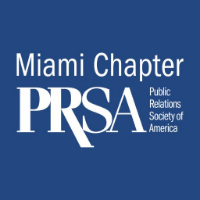

After the phenomenal success in Calgary, Atlanta and Vancouver, the Crisis Communications Boot Camp is coming for the first time to Florida!
Attending the Crisis Communications Boot Camp will enable you to:
In this two day intensive boot camp, international and regional PR and communications experts will share with you experiences and insights in how to develop and execute a strategy that will help your organization or clients weather inevitable crises.
Book before February 22nd to SAVE $300! Are you a member of PRSA Miami? Book now with with 20% discount!
Contact us today for more info on our group discounts!
09.00 Registration and Morning Coffee
10.00 Welcome Remarks
10.15 Lessons Learned from Clinton to Uber - The 9 Rules of Crisis Communications
Matt McKenna is a former spokesperson and Senior Advisor to President Clinton, the Clinton Foundation and the Clinton family. He has advised politicians and business leaders across the United States and has even run communications for the likes of Uber. His experiences from Alaska, to Silicon Valley, to the White House helped him identify the 9 most important rules for crisis communications. Matt will share his stories and lessons learned; and he will talk through how to always be prepared for a crisis, communicate through it and uphold an organization's trust, credibility and reputation in the process.
Matt McKenna, Former Senior Advisor to President Clinton, Former Head of Communications at UBER and Co-Founder & Managing Partner of Greenbrier
11.00 Patrick Jephson: Reputation Management For CEOs – Why CEO Reputation Management Matters More Than Ever
When your Boss is the brand, ultimately you may have to face the fact that they’re human after all. Today, reputations are more than ever at risk from the proliferation of global media … and increasingly unpredictable new media as well – phone cameras, Periscope, Facebook, for example. The lesson is the same: individual human being or global multi-national – their brand essence and values must be guarded more carefully and more vigilantly than ever.
In his session Patrick will help you identify the qualities people expect to see in their brands, prepare your CEO for major crisis, define the essence of your CEO’s brand, build the key message and most importantly, acquire substance, not spin.
Patrick owes much of his practical communications experience to Princess Diana, who chose him to be her equerry and only private secretary/chief of staff. He served the Princess for eight years (1988-96), responsible for every aspect of her public life, charitable initiatives, and private organization. He travelled with her to five continents, working with government officials up to head of state. Under relentless media scrutiny, his tenure covered the period of Princess Diana’s greatest popularity as well as the constitutional controversy of her separation from Prince Charles.
Patrick Jephson, NY Times Bestselling Authour, Former Chief of Staff to Princess Diana, UK
11.45 Interactive Discussion with Speakers and Delegates
12.15 Lunch for Speakers and Delegates
13.15 How Icelandair Persuaded the World That Their Country Is Still a Great Holiday Destination
On April 14, Eyjafjallajökull volcano in the south of Iceland started erupting clouds of black ash. The whole world soon woke up to the consequences, as airspace was closed down across Europe, affecting flights throughout the world. For five days it was the world’s biggest media story. All eyes were on the images of the powerful bursts of fire and ash, and on the geographical maps showing the distribution of the ash cloud. With air traffic coming to a standstill, millions of passengers were left stranded.
In this session, Gudjon will share with you lessons learned from the 2014 volcano eruption in Iceland- the damage it did to the brand but more importantly, the aftermath and strategies the country and the airline used to rebuild Iceland’s reputation and make it one of the world’s most visited tourist destinations.
Gudjon Arngrimsson, VP Communications, Icelandair, Iceland
14.00 Behind Palace Doors: Managing the Reputation of the British Royal Family
With more than 25 years’ experience, ranging from the British Royal Household, via Downing Street, to international NGOs, Colleen Harris has a strong track record of working in high-profile media and communications roles. This professional experience is complemented by a broad portfolio of trusteeships and non-executive director roles in the arts, education and health. In this interactive session, Colleen will share with you lessons learned from her work with The Prince of Wales during some of the most turbulent years in the British Monarchy.
Colleen Harris, Former Press Secretary to Prince Charles and Princes William and Harry
Spokesperson, Prince Harry and Meghan's Royal Wedding
14.45 Interactive Discussion with Speakers and Delegates
15.15 Networking and Refreshment Break
15.45 Handling Workplace Misconducts: What Role do Corporate Communicators Play?
The growing culture wars on identity and workplace misconduct have spurred significant vocal ire and activated new ‘couch propagandists’ and digital insurgencies that contribute to the new business ecosystem in a divided and angry world. Given the rise of these ‘snap-crises,’ companies must be far more vigorous in stress testing the tone and tenor of all public interactions – from earnings calls and direct- to-consumer advertising to culture wars on conduct and behaviour in the workplace – because the stakes are infinitely higher and costlier than even a year ago. These and other soft risks cost organizations roughly 40 percent in potential revenue annually, a particularly painful loss because it is avoidable at least in scope and scale. Proper risk sensing exists as well as a sober understanding of both brand and cultural identity.
Harlan Loeb, Global Chair, Crisis & Risk Mitigation practice, Edelman
16.30 Closing Discussion and End of Day One
09.00 Morning Coffee
10.00 Welcome Remarks
10.15-16.30 Fully Interactive Crisis Communications Workshop with Harlan Loeb, Global Chair, Crisis & Risk Mitigation practice and Rob Rehg, Chairman of U.S. Public Affairs at Edelman
Attending this workshop will enable you to:
- Conduct a vulnerability audit to assess potential crisis scenarios
- Create a core message that can be communicated across all social media channels
- Properly monitor your social media channels for potential problems
- Coach your spokesperson on the tough questions they may face from the media
- Engage the media and address misinformation and negative commentary
Part 1:
- Analyzing The Importance Of Reputation And Reputation Management: What is Reputation?
- Building trust
- Case studies of good and bad examples of reputation management
Part 2
Writing a Crisis Plan: The Role of Executives
Part 3
Key Principles of Crisis Management: Writting a Crisis Statement
Part 4
Managing The Media
This segment will include key tips in managing the media, giving broadcast interviews and the essentials of organizing a good press conference.
Part 5
Interactive Crisis Simmulation
Participants will be divided into groups and each group will select a spokesperson who will be interviewed on the particular crisis situation. As the crisis develops, other spokespeople will be taken.
The simulation will also include a press conference where the spokespeople have to answer journalist questions.
16.30 End of Crisis Communications Boot Camp 4
100 Chopin Plaza, Miami, FL 33131, USA
Tel: +13055771000 / Fax: +1(305) 577-0384
At InterContinental Miami, the city's vibrant art, innovative businesses, and tropical life converge into the premier luxury experience. Built around Henry Moore's famous sculpture, "The Spindle," our luxury Miami hotel lies on the downtown waterfront. The city's business centers and famous beachfronts are both within easy reach. Welcome to the pinnacle of luxury in Miami: InterContinental. Our luxury hotel in Miami is also the premier location for conferences, conventions, and events. 101,000 square feet of meeting space is available, spread across 33 meeting rooms. From catering to branding services, our professional event staff helps you craft an extraordinary event. The Grand Ballroom, which can host up to 800 guests, is decorated with ornate chandeliers. The Chopin Ballroom and Bayfront Room are additional elegant venues for weddings, meetings, and celebrations. With a location in Downtown Miami, your guests will stay convenient to the city's lively attractions.

This program can also be delivered as a tailored in-house training for your organization. We adapt the content to your industry, objectives, and level of maturity, focusing on real challenges your teams face and the decisions they need to make. In-house formats allow your people to align on a shared approach, work through relevant scenarios, and build skills they can apply immediately.
If you’re exploring an in-house option, tell us a bit about your team, priorities, and timing, and we’ll recommend the right format.
Contact us about in-house training